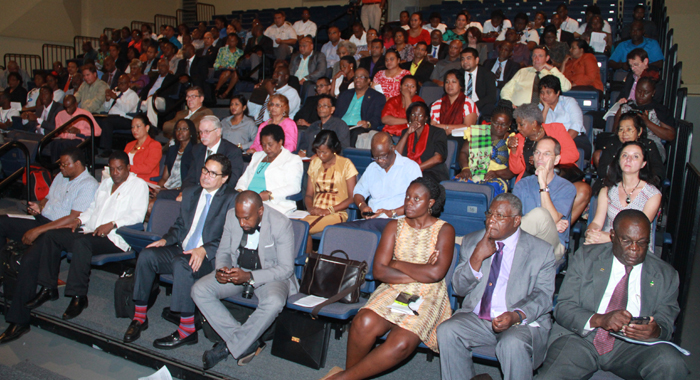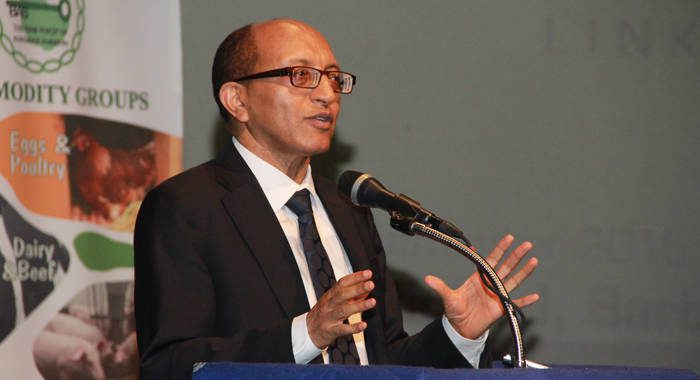By Kenton X. Chance
BRIDGETOWN, Barbados, CMC — The one-week Caribbean-Pacific Agri-Food Forum began here Monday with the region being urged to come up with solutions to the many problems plaguing the development of the agricultural sector in the Caribbean.
Director of the Netherlands-based Technical Centre for Agricultural and Rural Cooperation ACP-EU (CTA), Michael Hailu, told delegates that the main purpose of the week-long event is “not to be talking a lot about our problem and challenges”, which, he acknowledged, seems to be the trend in many of these workshops, in the Caribbean and other regions.
“We know the problems are more or less always the same — high food import bill, there is the problem related to nutrition; there is the problem of no interest in agriculture.
“I think all those problems we know. We can keep repeating them without making much change. What we’d like to see this week is refocus and look at solutions,” he said.
The forum will consist of 12 workshops that will run in parallel sessions during the first three days, and an agribusiness forum during the last two days.
The organisers said that it aims to make further progress towards more profitable and sustainable value chains and agricultural businesses that are inclusive of small-scale farmers, women and young entrepreneurs.
It will also try to create better agriculture-nutrition links and multi-sector collaboration leading to people owning their own nutrition agenda as well as build resilient communities and climate-smart agricultural practices and policies in the face of climate change.
Hailu said that there were “small things that are working, that are succeeding,” adding, “why don’t we try to scale them up.
“We make a deliberate effort to make sure that this forum centres on people and action, based on experiences from the field,” he said, adding that the forum will provide many opportunities for the exchange of experiences.
He said CTA values the approach of value chain agri-business.
“This has been one of the highlights of our current strategy, which we developed in 2011, and we are coming to the end now and embarking on a new strategy, so we are really putting a lot more focus on value-chain development and agri-business.

President of the Jamaica Agricultural Society, Norman Grant, told the ceremony that the forum must be treated “as a game changer” for the Caribbean and Pacific regions.
“We are ensuring that we insist in our deliberations that we identify specific areas in our deliberations what will assist the farmers, and more so small and medium farmers and agro stakeholders in the regions.
“Therefore, we will be looking to improve agricultural value chain and agro chain development through relations that are inclusive of small farmers, women and young entrepreneur across the region.”
Grant said a most important element of the forum was increasing the knowledge about the challenges relating to climate change and proposal for scaling up success stories that can link into more sustainable value chain and agro-processing business
He said farmers in the region have been very influential as it relates to the development of agriculture.
“Our farmers are foremost as it relates to economic development, hoping to use forum to send a clear message to the political directorate in this region and in the Pacific regions as it relates to the critical importance of supporting small- and medium-sized farmers as it relates to creating wealth.”
Grant said that in his view, this brings into focus the Caribbean Community (CARICOM) 1992 deliberation of what was dubbed “the Jagdeo initiative”, which identified nine constraints, which, if addressed, would have caused the region to realise food security by 2015.
Those constraints were financing, praedial larceny, high imports, capacity-building or farmers organisation, lack of marketing framework, nutrition, and the improvement of rural infrastructure, and climate change.
“And I’d like to say that during this forum we don’t need to re-invent the wheel. The matter of the Jagdeo initiative were outlined, and, in my view, we are not where we should have been in 2015 and my opinion is that those initiatives have not been critically addressed as it relates to the objectives that were embedded in the Jagdeo initiative.
“It tells me something, and I’d like to suggest to this forum that whatever outcome that we get over the next five days, we should not attach the name of any individual to that, but we should focus on ensuring that what we are doing it is an initiative by the people of the region, it is an initiative by the farmers of both regions and there is certainly commitment and collaboration to ensure that it works.”
Grant said financing for farmers is an important outcome that needs to be addressed during the forum, with a view to reducing the region’s five billion US dollar food import bill.
“So, I want to dub this a game-changing forum and I would like to thank all the partners for coming on board. I’d like to thank CTA and I am very, very confident that at the end of this week, we can have a plan that can lead to the advancement and the development of the region, through the advancement and the development of our stakeholders and particularly, our farmers within the region.”







These gabfests only benefit the attendees and their parent organizations whose sustainability is dependent on the continued marginality and decline of small-farming in their regions.
We have seen a slow but steady decline in small-farming/peasant cultivation for decades now in lock-step with the growth in dependency on cheaper and often better food imports from large-scale agriculture in developed and underdeveloped countries alike.
We know everything we have to know about the causes and effects of agricultural decline in the Caribbean and its link to industrial mega-farming elsewhere. We also know that no one who has other alternative will deliberately choose the backbreaking work of becoming a small farmer.
There is no reversing this inexorable trend, at least without doing much more harm than good by increasing trade, quota, and tariff barriers.
So why do we have these useless conferences? Because the livelihood and well being of the non-farming attendees depends on them.
I’ll bet that C.ben-David is or has been a farmer because he seems to know much more about farming than these people hosting these conferences. There are in fact very few opportunities for most farmers and far too many challenges. How is it possible to see opportunity in a hurricane or flood, let’s not even begin to mention droughts, or pests, including the two legged variety. I would like these jokers too show me opportunity in thieves stealing my crops…unless I too become a thief. What about the biggest thieves…the government!
The government of SVG can support Agriculture by supporting Agro-Processing, but they refuse to do this. They have astronomical Customs Duty charges on machines and packaging material, then the Customs almost always charges more duty on imports than they are allowed. They are the most-protected criminals in all the Caribbean. Ralph Gonsalves loves the money he can squeeze out of the middle-class through the Customs.